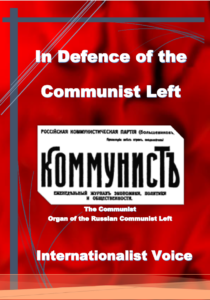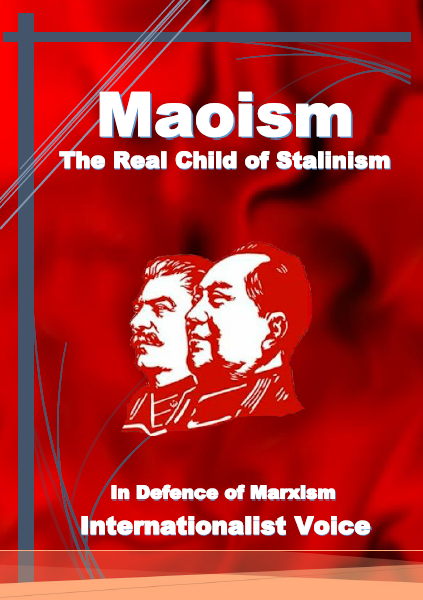In Defence of the Communist Left
During the height of the world revolution, a tendency was formed within the labour and communist movement which became known as communist left.[1] Since the communist left was formed during the height of the world revolution, it represents the strength of the proletariat. From that point until today, although it has been in absolute isolation at times, the communist left has always been a true defender of the interests of the working class and has acted as a political compass in social events.
The communist left’s actions in defending the class independence of the workers and emphasizing that only the class struggle of the proletariat can provide a perspective on the brutality of capitalism, and most importantly, its adherence to Marxism under any circumstances, have not been pleasing to the right and left movements of capital or adventurous circles and individuals. Therefore, throughout its proud history, the communist left has always been the target of smearing, discrediting, slandering, etc. You can see these slanders and discredits not only in any country and in any language, but also in any accent. In the early 1930s, at least in Europe, “enemy number one” for the Stalinists was not the Trotskyists, but the faction of the communist left.[2] The important issue is that communist left is not criticized, but is targeted for discrediting.
Apart from the right and left movements of capital, the goals of circles or adventurers have been to create a politically insecure milieu, to shape an environment with a lack of trust in the communist left and especially to generate scepticism towards the main currents of the communist left. Essentially, they present a sectarian image of the communist left and not the dynamic and rising currents which have historically been the defenders of communism and now act as a political compass.
They resort to the most heinous lies and slanders under the title of criticizing the theory of decadence or considering the communist left currents to be apocalyptic or deterministic. They pretend that communist left, with its deterministic theories, makes the role of the revolutionary subject meaningless and propagates passivity in the ranks of the working class. Without being able to refer to Marxism, they claim that the world revolution desired by the communist left is only a Marxian idea which prevents the working class from beginning a revolution. This list can be extended. Here, the discussion is absolutely not about the criticism of publications such as Aufheben.[3] In criticizing political positions, first of all, a person or a political current should take the trouble to critique, and secondly, a person or a political movement shows with its criticism where it stands in this upside-down world. Thirdly, most importantly, criticism of political positions leads to clarification of the political milieu.
The theory of the decadence of capitalism,[4] in short, is that the lifecycle of class production methods consists of two periods, including a stage of growth and development, in which the production relations allow the forces of production to grow, so that higher forms of production cannot be on the agenda. Then there is a phase of decadence in which the relations of production create an obstacle that is in the way of the forces of production, or in other words, the forces of production conflict with the relations of production. It is at this stage that the ground is prepared for new productive relations (social revolution) and changes are accordingly made in the forms of organization and the way of struggle of the working class. Marx emphasizes that only when the modern forces of production and the bourgeois forms of production come into opposition with each other can the revolution be the order of the day:
“Given this general prosperity, wherein the productive forces of bourgeois society are developing as luxuriantly as it is possible for them to do within bourgeois relationships, a real revolution is out of the question. Such a revolution is possible only in periods when both of these factors – the modern forces of production and the bourgeois forms of production – come into opposition with each other. The various bickerings in which representatives of the individual factions of the continental party of Order presently engage and compromise each other, far from providing an occasion for revolution, are, on the contrary, possible only because the bases of relationships are momentarily so secure and – what the reactionaries do not know – so bourgeois. On this all the reactionary attempts to hold back bourgeois development will rebound just as much as will all the ethical indignation and all the enraptured proclamations of the democrats. A new revolution is only a consequence of a new crisis. The one, however, is as sure to come as the other.”[5]
The global concept of the proletarian social revolution does not come from the innovations of the communist left and other Marxists such as Lenin, Luxemburg, Pannekoek, etc., but directly from Marx himself. After analysing the events of the 1840s, Marx revised the idea of continuous revolution and abandoned it.[6]
In fact, the concept of permanent revolution was itself an unsolvable problem. Based on the idea of permanent revolution according to Marx at that time, proletarian revolution was possible in some countries, while bourgeois revolution was still ahead in others. But as mentioned before, Marx reached the following conclusion during the summation of class struggles in France:
“Just as the workers thought they would be able to emancipate themselves side by side with the bourgeoisie, so they thought they would be able to consummate a proletarian revolution within the national walls of France, side by side with the remaining bourgeois nations.”[7]
The historical evolution of capitalism showed the truth of Marx’s next conclusion: capitalism provides the conditions for proletarian revolution only on a global scale. In other words, capitalism as a global system had entered its decline period. He did not mean that some parts of it had entered the decline period, while others were still flourishing. Only when capitalism was promoted to the world’s dominant mode of production did the era of imperialist wars and communist revolutions begin, and its stage was the First World War.
For the communist left, internationalism is not merely a matter of propaganda or a religious principle, but a class boundary, distinguishing between the bourgeois and proletarian camps. With this correct understanding, the communist left has been able to remain loyal to internationalism in all wars and not make the workers cannon fodder in imperialist hostilities.
Contrary to the falsehood and vanity that the communist left considers the role of the revolutionary subject meaningless, it evaluates class struggle as the engine of history for transformations and believes that if the working class does not follow its historical task, that is, to overthrow capitalism through the communist revolution, the destruction of humanity is certain. This would definitely not occur through a world war, but could also happen through the continuation of the brutality of capitalism, the spread of a virus or an environmental disaster. However, what the communist left has always emphasized is the independence of the working class in its own struggle.
The communist left is not only a series of theories but also the defence of proletarian values and principles. The undeniable fact is that the labour movement and its communist organizations, throughout history, have been the target of the influence of bourgeois and petty bourgeois ideologies. Therefore, the struggle against these and the defence of communist values should always be a part of communist left practices.
The existential necessity of the communist left is due to the existence of class society and wage slavery in society. The communist left is the true continuation of Marxism. As long as there is a class society, as long as there is wage slavery, in social events and in class battles, the communist left can act as a political compass. We encourage all the militants whose issue is the liberation of wage slaves from the brutality of capitalism to enter into discussion and even controversy with the communist left movements and become part of the internationalist struggle of the working class.
The political tradition that has fought in defence of Marxism not only against the right and left movements of capitalism, but also against adventurers and intermediate movements, continues its struggle and its defence of Marxism and proletarian goals.
Internationalist Voice
25 February 2024
Notes:
[1] We have dealt with this very briefly in an article entitled “Introduction to the Communist Left.”
[2] For more information, refer to the book Trotsky and Trotskyism – How Trotskyism Was Integrated into the Left of Capital.
[3] Aufheben was a magazine published in Britain in the 1990s that critiqued the theory of decadence of capitalism under the title “The Theory of Decline or the Decline of Theory?” and it also received its answer.
[4] Here we do not enter into the mechanisms of the crisis of the decline of capitalism.
[5] The Class Struggles in France, Marx – page 71
[6] We have discussed these issues in detail in the book Leftism in the Role of Metamorphosed Councilism with reference to Marx himself.
[7] The Class Struggles in France, Marx – page 19














